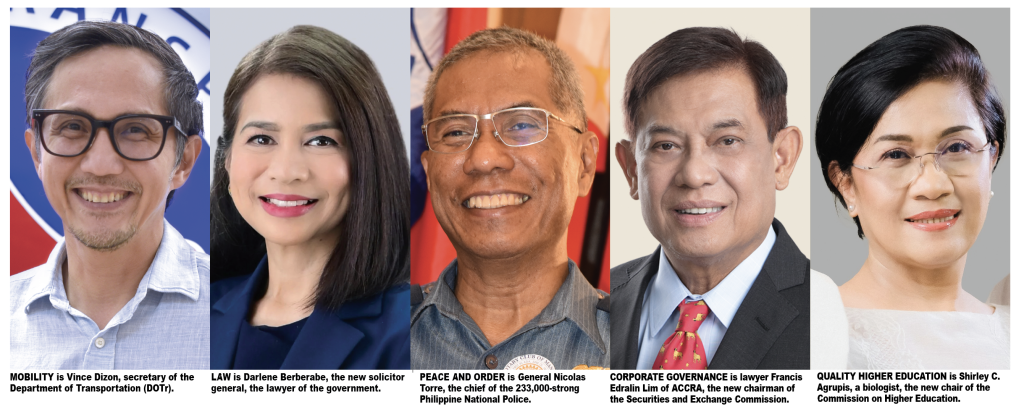By TONY LOPEZ

Mobility. Peace and order. Law. Corporate Governance. Higher Education.
These are the themes I gather from President Ferdinand R. Marcos Jr.’s calibrated efforts to revamp his cabinet and reset his presidency.
Mobility is Vince Dizon, secretary of the Department of Transportation (DOTr). Since Feb. 21, 2025, every day has been a dazzling day for government in action and presence. For the hoi polloi.
Vince ordered the removal of a VIP lounge in a crowded provincial airport to create more space for the masses of travelers; Metro Manila and provincial bus companies to build decent bus terminals (meaning clean toilets, weather-proof waiting lounges, and no mulcters) in the national capital; LRT and MRT stations to stop x-ray security screening of commuters to reduce long lines; the price-gouging plane ticket consolidator AirAsia Move to be prosecuted and its removal online when it proved defiant; more train coachers and more buses deployed on Metro Manila commuter lines; and better treatment by the government of Filipino travellers at NAIA.
EDSA work suspended
Vince advised PBBM to suspend (not cancel) a P9-billion, two-year rehab of EDSA which would have denied 500,000 motorists access daily to the Philippines’ premier metropolitan thoroughfare and eviscerated whatever is left of the President’s approval rating (25%) to below zero overnight, making him the most unpopular president in history.
On Tuesday, June 3, 2025, Vince accompanied PBBM to visit the NAIA Terminal 3 to update himself on SMC CEO Ramon Ang’s herculean efforts to make Manila International Airport one of Asia’s—if not the world’s—best. Marcos Jr. was so impressed he declared, “I have been to this airport I don’t know how many times. It’s the nicest I have seen this airport for 20, 30 years.” “Keep it going,” the President told RSA.
Government’s experience with San Miguel’s NAIA—and of course, Lance Gokongwei’s Clark Airport—have convinced Vince to privatize more airports. Local and foreign conglomerates (like Singapore’s Changi) are looking into Philippine airports privatization.
An archipelago of 7,600 islands, the Philippines needs asap 400 airports with a 3-km runway. Only the private sector has the moolah and management expertise and integrity to deliver those airports.
General Torre
Peace and order of course is General Nicolas Torre, the chief of the 233,000-strong Philippine National Police.
Before, when people had a problem, they saw the police. Today, when people see the police, they have a problem. Nic Torre will put a lie to that. He will deploy policemen, who are nice and not corrupt, out into the streets, day and night. Torre’s appointment says in effect his arrest of Rodrigo Roa Duterte on March 11, 2025, was right and legal.
Law is Darlene Berberabe, the new solicitor general, the lawyer of the government.
Behind a beauty’s calming smile is a Batangueña warrior streak, which if combined with her legal proficiency and managerial talent (hey, she ran the P100-billion a year Pag-IBIG Fund producing P25 billion in annual profits) should put fear in the hearts of the state’s enemies—like the corrupt, the incompetent, dynastic politicians, and the patriarch of an entrenched dynasty enjoying the beach scenery of Scheveningen, The Hague. BBM’s first SolGen, Menardo Guevarra (No. 2 in the 1985 Bar, an economist and expert in Maritime Law) apparently had burnout espousing Manila’s advocacy in the West Philippine Sea and seeking justice for human rights victims against Digong Duterte, his former boss.

Corporations
Corporate governance is lawyer Francis Edralin Lim of ACCRA, the new chairman of the Securities and Exchange Commission, the superbody that regulates corporations, the capital market, and issuance of IOUs (or debt papers) to more than 20 people.
Instead of promoting economic prosperity thru entrepreneurial vigor and capital mobilization, SEC has become nothing more a sluggish bureaucratic monolith enmeshed in paperwork, bureaucratic requirements for corporations, and collecting fees for failure of people and firms to file papers by deadline.
At 89, our SEC is one of the oldest in Asia. Our stock market is also Asia’s oldest and for a while the largest.
Filipinos invented Asia’s banking (They were ready to do finance with imperialists from Spain and Mexico in the 16th century; ask Ayala and Aboitiz).
Our banks used to be ASEAN’s largest. Today, our stock market is the smallest—in market cap and number of listed firms (owned by just 20 people), in ASEAN.
The PSEi knows only one level—6,000 points.
One bank in Singapore has more assets and deposits than all the assets and deposits of the ENTIRE Philippine banking system.
The number of Philippine corporations? It never grew—one million, 99% small firms.
Challenging job
“It’s a challenging job,” says Francis of his new mission. Offhand, he says, “We have to simplify the processes, streamline things for the short term, and make the SEC a BSP-like institution in the long term. I want to make the SEC as business and investor-friendly as possible and a meaningful contributor to the country’s economic development.”
Quality higher education is Shirley C. Agrupis, the new chair of the Commission on Higher Education (CHED).
Like the brain of millions of young Filipinos, quality is down among our colleges and universities. “Higher” tuloy—sounds sarcastic.
Under Popoy de Vera’s CHED, Philippine universities were declining in global rankings. Sad for a country that boasts of Asia’s oldest university.
UST (1611) is a quarter century older than Harvard (1636), America’s oldest and best university.
Agrupis is an agricultural scientists and was president of the Mariano Marcos State University which was established in 1978 by President Marcos Sr. by merging three colleges—in science and technology, agriculture, and arts and trades. A scientist (biologist, cum laude, from MMSU) and UP Los Baños alumna (master of science), Shirley should bring quality science-based higher education to an ancient profession called agriculture. Expect quality food at good prices.
